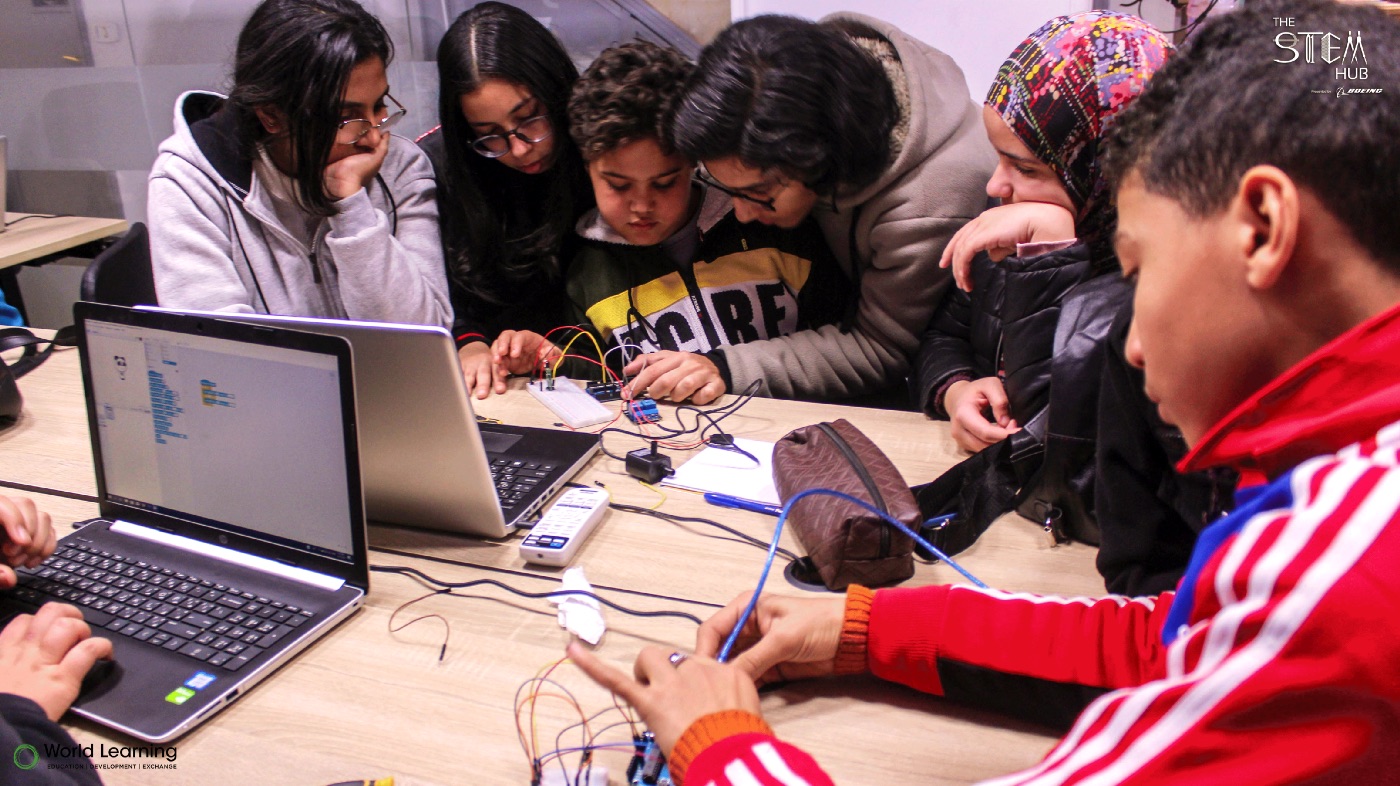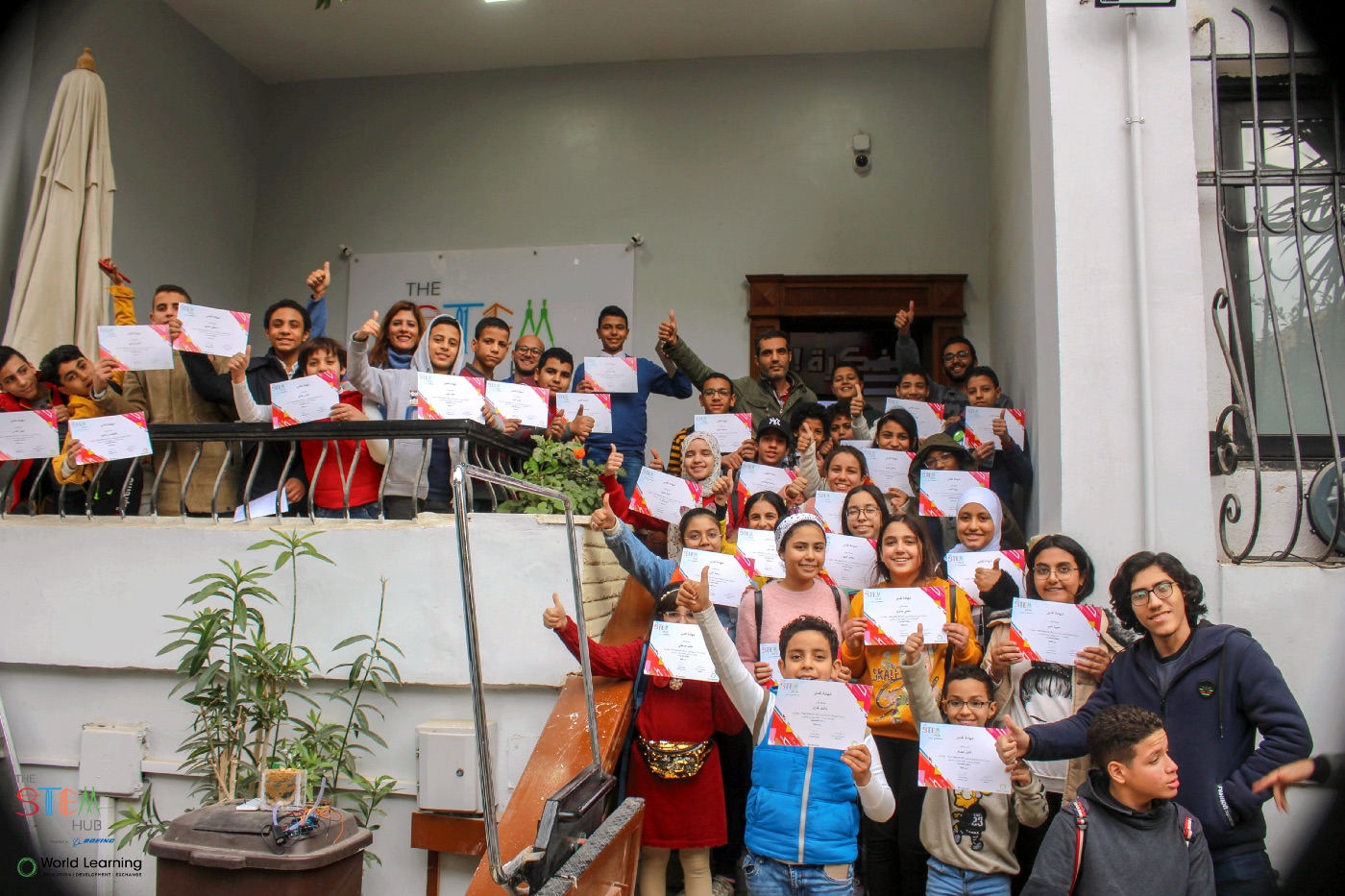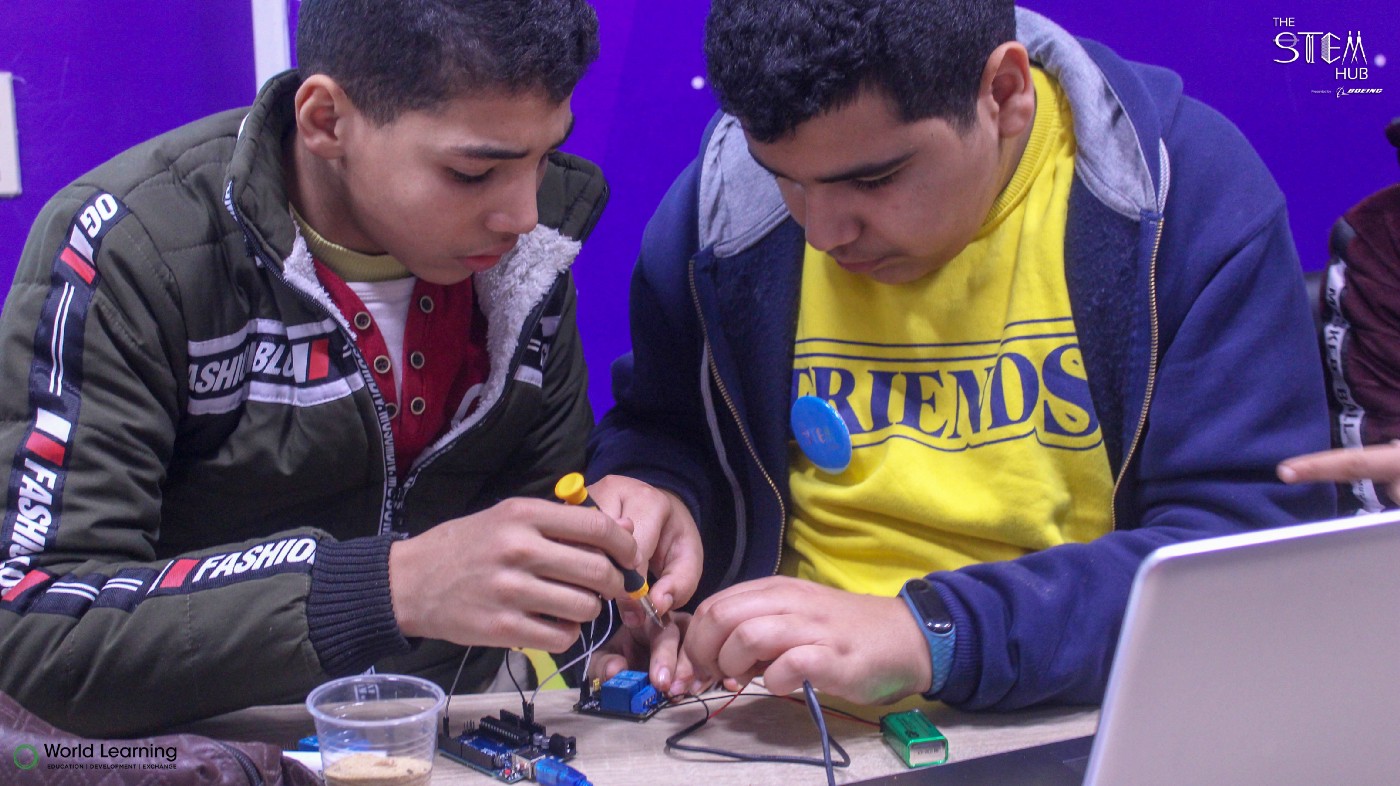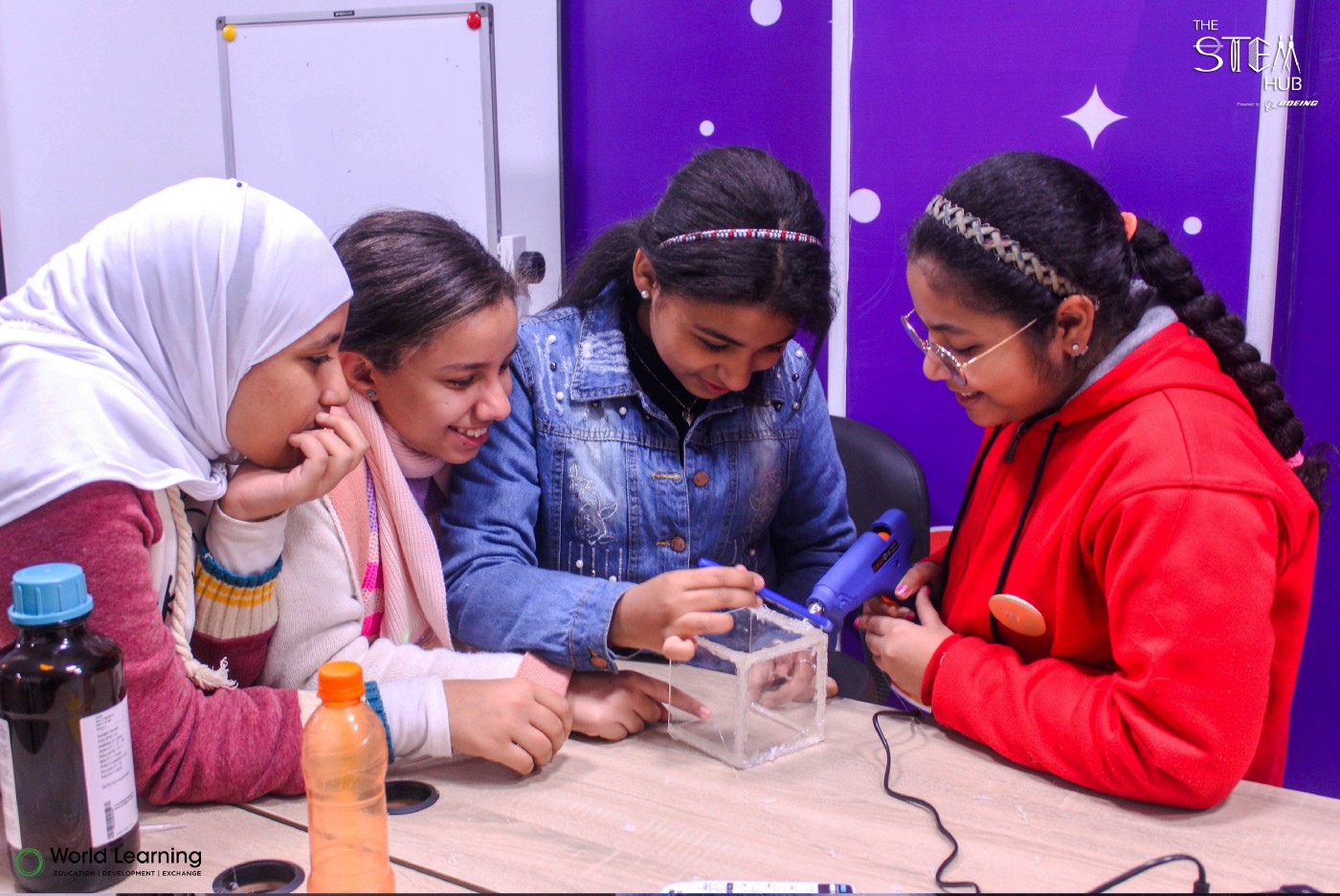-
What We Do
- WHERE WE WORK
-
About Us
 Welcome Message from Carol Jenkins
Welcome Message from Carol JenkinsFor more than 90 years, World Learning has equipped individuals and institutions to address the world’s most pressing problems. We believe that, working together with our partners, we can change this world for the better.
On my travels, I’ve had the opportunity to meet with many of those who have joined us in this mission. In Baghdad, we’ve trained more than 2,300 Iraqi youth who are already giving back at home. In London, our partners in the TAAP Initiative strongly believe that we are all responsible to practice inclusion. And in Vermont, our Experiment in International Living and School for International Training participants prove every day that they have the tools and the determination to change the world.
Please join us in our pursuit of a more peaceful and just world.
- Get Involved
Media Center > Story
Egypt STEM Hub Facilitator Part of Team Awarded National Science and Technology Prize
August 4, 2020

The STEM Hub Egypt is a learning center equipping the country’s young scientists, innovators, and entrepreneurs with the necessary skills to lead the North African country into a new era of technical innovation.
It’s a project of World Learning, focused on exploration and discovery in what’s known as STEM fields — science, technology, engineering, and mathematics.
One of the center’s workshop facilitators and content creators, Bassam Fotouh, is part of a team of university students who spent almost a year envisioning various scenarios for Egypt in the year 2050.
This summer, they won first place in a national competition organized by Shell called Imagine the Future and made it to the finals for the global prize, which will be announced August 11.
“It was challenging and fun applying the knowledge we have trying to come up with scenarios to predict the future of an Egyptian city,” he says.

Fotouh, who is a rising senior, finishing a bachelor’s of science degree in nanomedicine and machine learning from the University of Science and Technology at Zewail City, was invited to join the team by classmate Amira Khalil, who is studying biomedical sciences. The rest of the team included Bassel Jamel, Anas Mustafa, and Mazen Moataz, who are also studying biomedical sciences; Ahmed Hasaballah, an aerospace engineering student; and Eyad Al-Enani, an environmental engineering major.
Fotouh says despite his busy schedule at university and the STEM Hub, he immediately jumped at the chance to join the team and enjoyed working collaboratively with students in other disciplines.
Competing against dozens of other teams around the country, including several at his university, ZU12, as Fotouh’s team was called, imagined what the southern Nile city Aswan would be like in the year 2050.
The team presented two scenarios for utilizing several technologies, such as artificial intelligence (AI), in Aswan.
Fotouh is excited that his team won first place in the national competition and says he cherishes the friends he made and the memories they have traveling together while working on the project.
“That was the real win,” he says.
Beyond that, Fotouh points out that the competition put Egypt on the map for its vision of the role of future energy technologies and their impact on local and regional communities.

Fotouh, who is a rising senior, finishing a bachelor’s of science degree in nanomedicine and machine learning from the University of Science and Technology at Zewail City, was invited to join the team by classmate Amira Khalil, who is studying biomedical sciences. The rest of the team included Bassel Jamel, Anas Mustafa, and Mazen Moataz, who are also studying biomedical sciences; Ahmed Hasaballah, an aerospace engineering student; and Eyad Al-Enani, an environmental engineering major.
Fotouh says despite his busy schedule at university and the STEM Hub, he immediately jumped at the chance to join the team and enjoyed working collaboratively with students in other disciplines.
Competing against dozens of other teams around the country, including several at his university, ZU12, as Fotouh’s team was called, imagined what the southern Nile city Aswan would be like in the year 2050.
The team presented two scenarios for utilizing several technologies, such as artificial intelligence (AI), in Aswan.
Fotouh is excited that his team won first place in the national competition and says he cherishes the friends he made and the memories they have traveling together while working on the project.
“That was the real win,” he says.
Beyond that, Fotouh points out that the competition put Egypt on the map for its vision of the role of future energy technologies and their impact on local and regional communities.
The STEM Hub offers programs specially designed to allow young participants, age 8–16, explore, apply, and innovate through hands-on activities and a project-based learning approach.
STEM Hub Director Yasmine El Bendary says: “The STEM Hub Egypt’s mission is to create an inclusive learning environment where young people can combine their natural creativity and their new STEM skills to create innovative solutions for local problems and global challenges.”
Courses include robotics, coding and programming, environmental recycling, energy management, business and entrepreneurship, and graphic design and multimedia.
Fotouh, who is from Suez, a seaport city in north eastern Egypt, is co-leading the coding and programming courses, which he developed.
Fotouh says there are many things he loves about working at STEM Hub, such as the way peer instructors learn new things from each other and the opportunity to work closely with the kids, especially teaching and interacting with them and observing the result of their efforts and the new learning they’ve stimulated.
“I love communicating about the sciences,” Fotouh says.
The STEM Hub offers programs designed to allow participants to explore, apply, and innovate through hands-on activities and our project-based learning approach. The Center’s learning methodology seeks to improve the process of knowledge acquisition while leveraging the skills, talents, and leadership potential of Egyptian youth.
In each of the courses, students are encouraged to work on a team project that they come up with.
“We give students the freedom to choose whatever ideas they want to work on,” says Fotouh.

“They never fail to amaze us,” he says.
Due to the pandemic, students have been working remotely on projects about COVID-19, raising awareness about global citizenship, and fighting against racism. Others are working on improving mental health, education, communication, and entertainment through games.
Fotouh says the process of building their projects is filled with trial and error — explaining “that’s how the learning happens.” They propose their own solutions, “that way they learn to solve problems,” he says.
El Bendary agrees. “We’re proud to support our participants as they discover their interests and develop their boundless potential.”
“We’ve succeeded in changing the way students think about education while also introducing them to STEM and project-based learning,” Fotouh says, adding that they learn to use their creativity to solve real-world problems.
“That’s the success.”
Fotouh also works as an undergraduate research assistant at the Center for Materials Science, NBE Institute for Nanoscience and Informatics.
In 2017, he was chosen as Ain Shams University’s representative at the Science Operation Leaders in Egypt (SOLE) Conference & Competition. Last year, he developed his own play in the field of medicine called King Tutankhamun’s Burial Chamber, which was presented at the Zewail City Science Festival
He’s currently studying for the GREs and hopes to be accepted to a PhD program in the U.S. or Canada.

Fotouh’s first choice is the Medical Engineering and Medical Physics (MEMP) program offered by the inter-institutional collaboration between MIT and Harvard in health sciences and technology because of his passion for interdisciplinary studies that combine engineering and medicine. He also wants to be part of a community that shares his interests and supports and pushes him to exceed his limits.
The program is for engineers and scientists who want to impact patient care by developing innovations to prevent, diagnose, and treat disease.
Fotouh says that science is the ultimate tool that expands people’s horizons and empowers them with different perspectives to solve the problems.
He adds that it’s a team effort: “I’ve been lucky to have a good education and I’m a skilled communicator and presenter. That gave me the idea of communicating science for the public to participate and use this knowledge along with their creativity to make our world a better place, free of poverty, diseases, and conflicts.”





